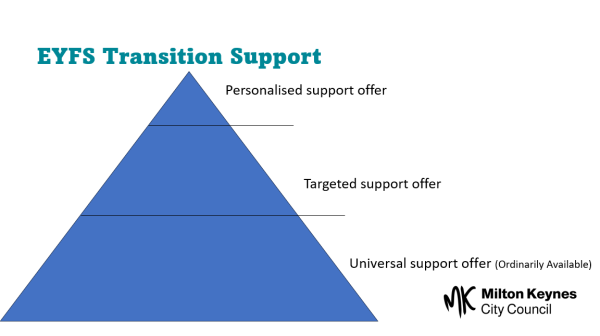Early Years Settings should:
- Use the Early Years Ordinarily Available Provision Document to support planning and practice
- Utilise the SEND Local Offer transition pages for advice and support: Starting or changing school and transition support | Milton Keynes City Council
- Signpost parents to further advice and support as above
- Reach out to schools in their area to find out what transition looks like in each school
Schools should:
- Use the Ordinarily Available Provision Document (both settings and schools) to support planning and practice
- Develop a Transition Policy that sets out process for all children, and typical reasonable adjustments for those who have SEND/EAL
- Plan for and support the transition of children moving from maintained nursery class into EYFS by liaising with school colleagues, considering what provision is working and will need to be replicated
- Ensure transition days/events are communicated and offered to all, with reasonable adjustments considered
- Reach out to local EY providers in their area as part of planning for the cohort joining
- Use their MAT resource as appropriate for guidance and support
SEND Team and Health will support by:
Regularly updating the Transitions page SEND Local Offer with involvement from settings/schools
- Ensuring that Health web pages are regularly updated
- SEND Support Line for professionals/settings/schools for general enquiries that cannot be answered by LO (expected SENCo is main point of contact)
- Collate ‘Transition List’ of all children starting school with identified SEND, in conjunction with Health and Sensory Team colleagues to inform local area strategy
- EY SenCo meeting for providers on transition processes and expectations during May
- Offering SaLT training packages to schools re: creating communication supportive environments

